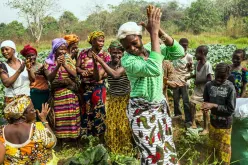Ladu Lemi serves as a UN Volunteer with the UN Environment Programme (UNEP). On the occasion of the International Day for Biological Diversity, he shares his experience delivering communications for environmental sustainability.
It is often said that experience is the best teacher. As a UN Volunteer helping communicate complex environmental issues, my everyday challenge is to make nature relevant to people’s everyday experiences and needs.
Our experiences and immediate needs shape our outlook on life. However, biodiversity and environmental issues are often too complex and difficult to relate to. Most people, in their daily routines, live and work in cities, spending the bulk of their time indoors, surrounded by concrete walls and engulfed in a world that seems largely man-made.
Environmental degradation and loss of biodiversity due to unstainable utilization has pervasively affected communities, causing unprecedented levels of poverty globally. Entire livelihoods of some communities have been totally disrupted. --Ladu Lemi, UN Volunteer with UNEP
As an international UN Volunteer serving with UNEP, I contribute to the goals of the African, Caribbean and Pacific Multilateral Environmental Agreements (ACP MEAs) Programme. The Programme is an initiative of the European Union, implemented by UNEP's Law Division. It supports countries in these regions in fulfilling their obligations as parties to multi-lateral environmental agreements, due to lack of adequate capacity to address increasingly complex scientific and technical issues.
The ACP MEAs Programme adopts an integrated and synergistic approach to bring long-term environmental sustainability, by mainstreaming biodiversity into agriculture and enhancing oceans governance to protect marine ecosystems.
I support programme communication and awareness-raising. This involves strategically targeting specific audiences – like decision-makers and parliamentarians, civil society actors and academia – to impact crucial decision-making processes for the conservation of natural environment. I also promote information and knowledge exchange among partners through South-South cooperation.
As part of my role, I liaise with regional partners and the European Commission, and develop and disseminate knowledge products to ensure that stakeholders are aware of the significance of implementing multilateral environmental agreements for addressing environmental issues.
Raising public awareness and knowledge on environmental management promotes the adoption of sustainable and equitable use of natural resources. This helps communities make informed choices, develop positive attitudes and sustainable solutions for biodiversity conservation. This in turn contributes to the eradication of hunger and poverty.
With a background in plant sciences and environmental policy, my professional experience evolved from academia to humanitarian and development fields. I have worked with GIZ, JICA and other organizations in South Sudan, helping communities build livelihoods and governments develop development policies.
I have always viewed volunteering as a personal duty towards my community. Directly after completing high school in the early 2000s, I became the youngest volunteer schoolteacher for two years, and after graduating from university, I volunteered at Juba University as a biological sciences lecturer for more than three years.
My experience as a volunteer, coupled with social appreciation of volunteerism, have strengthened my belief in the spirit of community service. Becoming a UN Volunteer with UNEP has been an opportunity for me to give back to the global community, and learn how voluntary community service is shaping development across the world.

